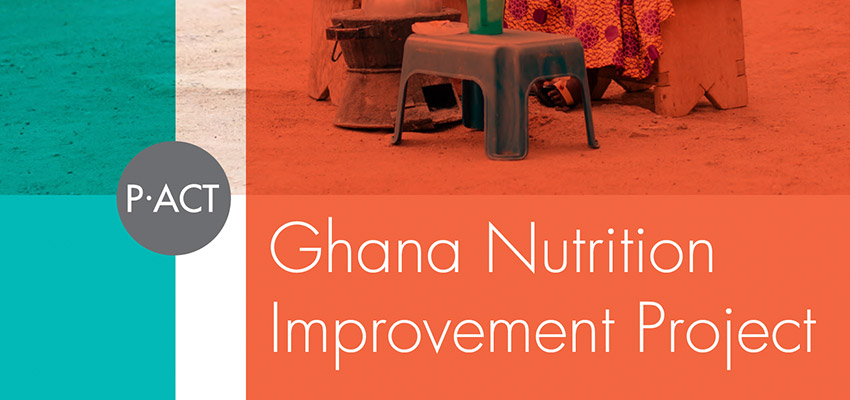
Ghana Nutrition Improvement Project: Co-designing a P.ACT to tackle infant malnutrition
Executive Summary
According to the 2016 Global Nutrition Report (Ref 7), it is estimated that a $1 (USD) investment in nutrition can generate a social impact equivalent to $16. In Ghana, child malnutrition is still a predominant challenge with a national stunting prevalence rate of 21% (2018) and only 13% of children 6 to 23 months of age receiving a minimum acceptable diet (Ref 1). The Ghana Health Service (GHS), a Ghanaian government body that manages the delivery of comprehensive health services at all operational levels nationally, has been working actively to curb child malnutrition through diverse complementary strategies, aiming to reduce the national stunting rate to 14% by 2025.
The Ajinomoto Foundation (TAF) was established in 2017 to lead the implementation of the Ghana Nutrition Improvement Project (GNIP), a multistakeholder collaboration initiated in 2009 that resulted in the development of KOKO Plus (KKP), a nutrition supplement product designed to improve the nutritional profile of traditional complementary foods used by Ghanaian mothers.
In 2018, GHS and TAF joined forces to collaborate on disseminating improved nutrition education to mothers, promoting KOKO Plus and educating caregivers on the proper use of the product. In urban markets, the partners developed and piloted a social business model that consists of 1– equipping GHS health workers to deliver enhanced nutritional counseling, 2– promoting improved nutritional behavior through a battery of social marketing activities, and 3– distributing KKP at an affordable price through last-mile retail shops in the proximity of GHS clinics. In 2020, the partnership had been deployed in 57 districts serving 86,000 mothers, and the partners aim to extend to 178 districts by 2025, reaching 490,000 beneficiaries across the country.
In preparation to further expand the partnership in Ghana, TAF leaders invited their GHS counterparts to use the P.ACT methodology as a framework to review the partnership success factors, extract lessons learned and start planning for the future of the collaboration. Published in 2020, the P.ACT Toolkit was co-developed by MIT D-Lab1 and SEED2 to equip impact practitioners with practical tools and methods to co-create inclusive hybrid partnerships. During the spring of 2021, MIT D-Lab facilitated six virtual workshops for GHS and TAF representatives to diagnose, explore, and plan for the future of their partnership by using a selected number of P.ACT tools.
The P.ACT workshops enabled GHS and TAF to identify key success factors as well as opportunities to improve and strengthen their partnership for the future. The partners identified the following factors as some of the key strengths they can leverage and build upon for the future of the collaboration:
- Strong Alignment on Impact Goals: Both partners are strongly committed to and aligned on the partnership’s social impact goals, which include improving infants’ nutritional status and making a sustainable shift in mothers’ nutrition practices.
- Complementary Capabilities: TAF and GHS bring strong capabilities in behavior change and health education, while their value chain partners provide the key complementary capabilities required to fulfill the partnership goals.
- Clear Value Chain Roles: The value chain actors have distinct and clearly defined roles; they are able to deliver the intended value to the partnership beneficiaries both in terms of nutritional improvement and behavior change.
- Balanced Returns: The partnership augments both partners’ value propositions and capacity to access and engage their common beneficiaries, while they perceive different but balanced advantages from the collaboration.
The P.ACT engagement also revealed several opportunities to further strengthen the partnership model in anticipation of the partners’ expansion plans. TAF and GHS decided to prioritize the following areas for establishing collective action plans though
the P.ACT process:
- Success Metrics: The partners established a detailed monitoring dashboard for the partnership. They identified specific indicators and targets to drive and monitor the partnership towards its goals.
- Financial Sustainability: The partners shared and discussed a plan to reach financial sustainability by 2023, which includes reducing the subsidy level over time by curbing value chain costs as to free up resources for scaling.
The P.ACT process enabled both partners to further clarify their mutual drivers for engaging in this collaboration, and to clearly define the costs that each partner incurs for engaging in the partnership. Furthermore, the conversations contributed to boosting both partners’ confidence in the future of the collaboration and particularly in their capacity to manage the project performance and risks. Lastly, the partners established a common understanding of financial sustainability as a shared goal and started co creating a scaling plan and assessing the capabilities required to implement it.
At the end of their P.ACT experience, GHS and TAF representatives reflected on their takeaways, expressed appreciation for the participatory process and reported positive changes in their knowledge and mindsets towards partnerships as a result of this engagement. As they embark on the next stage of their partnership, GHS and TAF used this opportunity to strengthen the foundation of their collaboration, renew their mutual commitment to their common goals and establish new action plans as cornerstones for their future success.
More information
P-ACT: Partnership Co-Design Toolkit
Contact
Saida Benhayoune, MIT D-Lab Program Advisor

